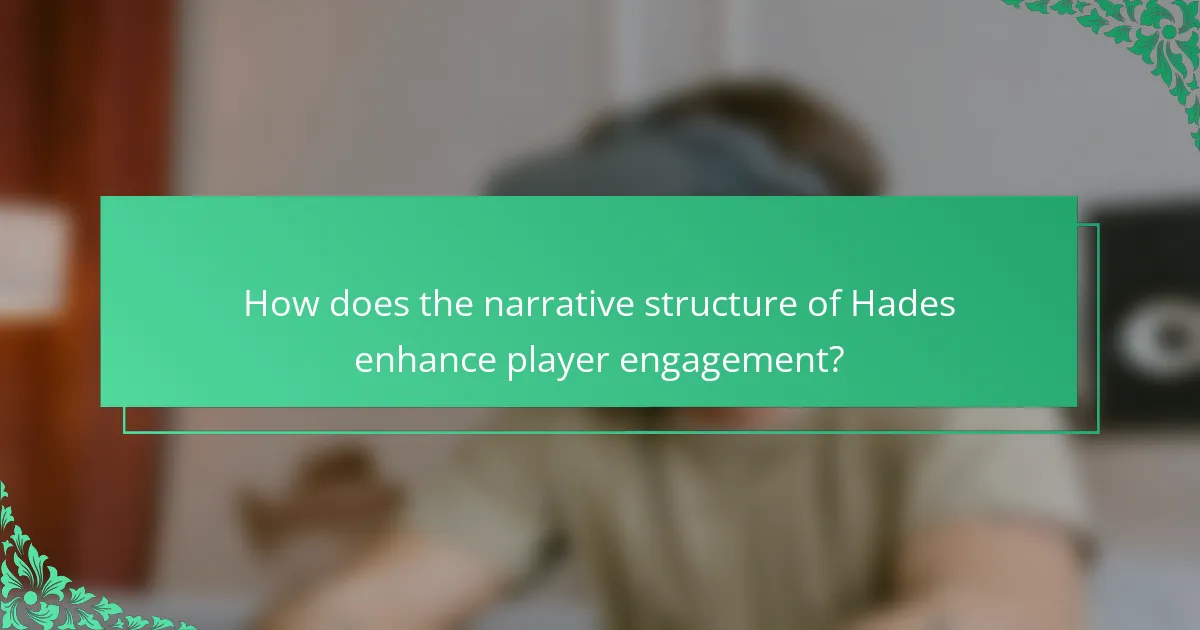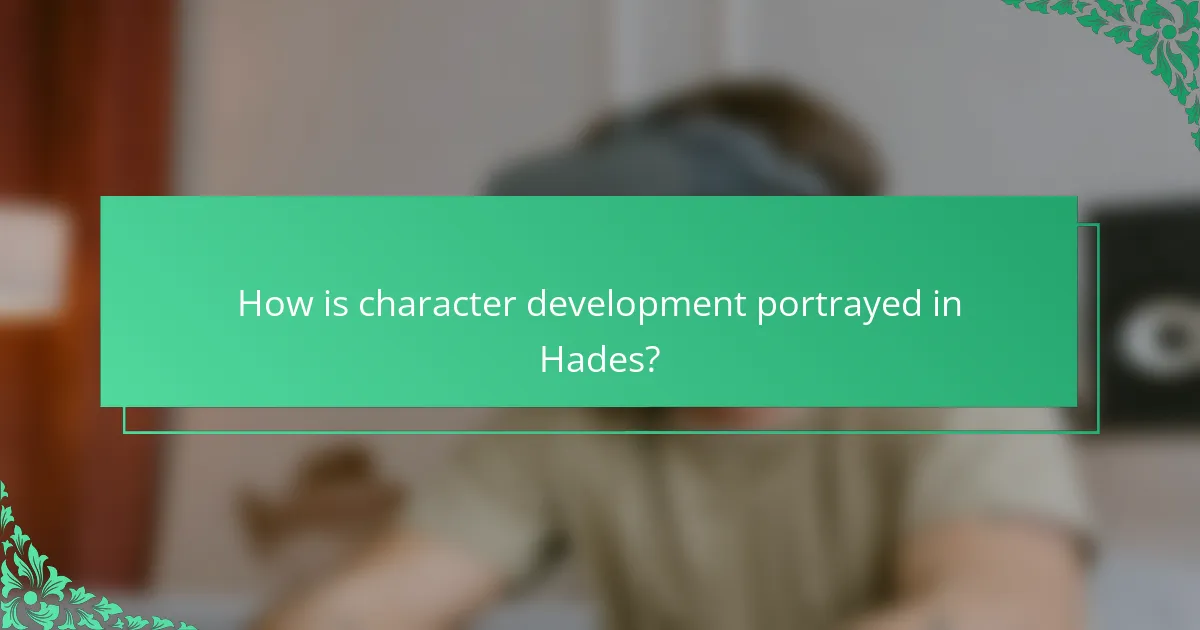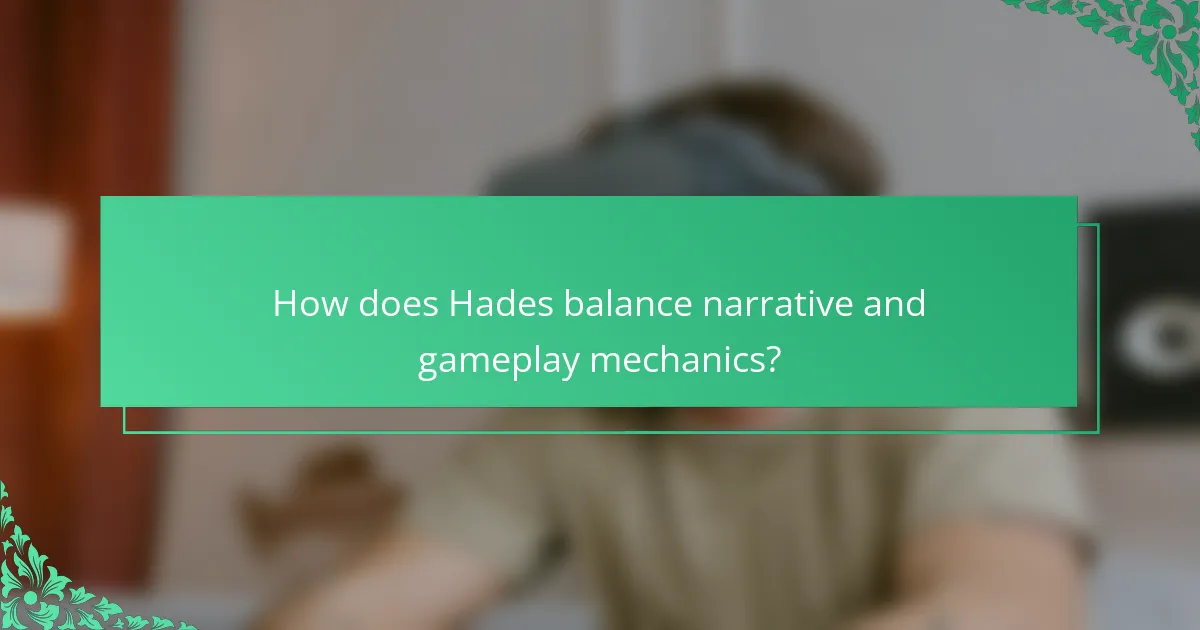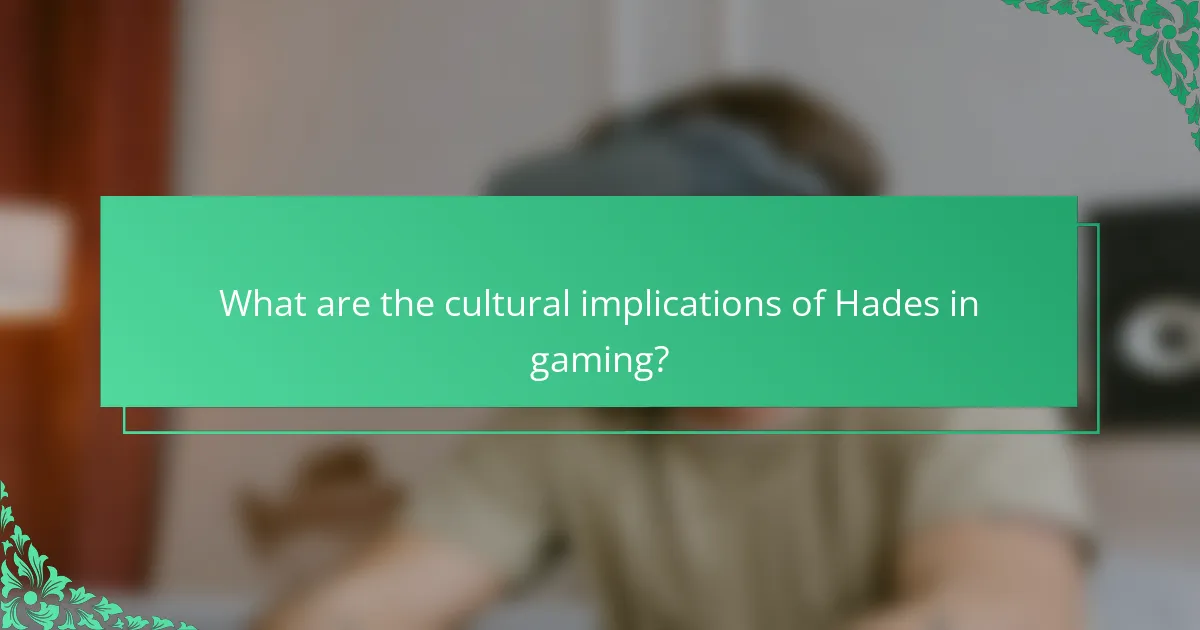Hades captivates players with its engaging narrative structure and deep character development. The game features a rich storyline that evolves with each run, enhancing emotional investment. Players experience unique character arcs influenced by their choices, contributing to high replayability. Additionally, varied gameplay mechanics and procedural generation ensure fresh challenges in every playthrough.

How does the narrative structure of Hades enhance player engagement?
The narrative structure of Hades significantly enhances player engagement by intertwining character development with gameplay. This structure allows players to experience a rich, evolving storyline that unfolds with each run. The use of dialogue and interactions with characters deepens emotional investment, making players eager to explore different outcomes. Unique attributes like the branching narrative paths and the consequences of player choices create a sense of agency, increasing replayability. As a result, players are motivated to return, uncovering new layers of the story and character relationships with each attempt.
What are the key narrative techniques used in Hades?
Hades employs various narrative techniques, including character-driven storytelling, dynamic dialogue, and branching narratives. These techniques enhance player immersion and emotional engagement. Character development unfolds through interactions with deities, revealing personal backstories and evolving relationships. Replayability is achieved via randomized dialogue and encounters, ensuring fresh experiences with each playthrough.
How does the dialogue system contribute to character development?
The dialogue system in Hades significantly enhances character development by providing depth and context to interactions. Through branching conversations, players gain insights into characters’ motivations, backgrounds, and relationships. This dynamic exchange allows for unique narrative experiences that evolve with each playthrough, reinforcing the game’s themes of growth and redemption. The rich dialogue contributes to a deeper emotional connection between players and characters, making the story more impactful.
What role do mythological elements play in storytelling?
Mythological elements enhance storytelling by providing depth and cultural resonance. In the context of Hades, these elements shape narrative structure, enrich character development, and boost replayability.
Mythological themes create a framework for the plot, allowing for complex story arcs and moral dilemmas. Characters, influenced by their mythological roots, exhibit distinct traits and motivations, contributing to their growth throughout the narrative. The replayability factor is heightened as players explore different outcomes based on mythological choices, encouraging multiple playthroughs.
In summary, the integration of mythological elements in Hades deepens the narrative experience, making it more engaging and memorable.

How is character development portrayed in Hades?
Character development in Hades is portrayed through dynamic interactions and evolving relationships. Players witness characters grow as they respond to the protagonist’s actions and decisions. Each encounter reveals deeper layers, showcasing unique attributes such as personal backstories and motivations. The narrative structure emphasizes replayability, allowing players to explore different character arcs and outcomes. This design fosters a rich emotional connection, enhancing the overall gaming experience.
Which characters undergo significant arcs throughout the game?
Several characters in Hades undergo significant arcs, notably Zagreus, Persephone, and Hades. Zagreus’s journey centers on his quest for identity and acceptance, evolving from a rebellious son to a determined hero. Persephone’s arc reveals her struggles with motherhood and freedom, showcasing her transition from a captive to an empowered figure. Hades, initially portrayed as a stern ruler, gradually reveals layers of vulnerability and complexity, highlighting his relationship with Zagreus. These character developments enhance the narrative depth and replayability of the game.
How do player choices influence character relationships?
Player choices significantly shape character relationships in Hades by influencing dialogue, emotional connections, and narrative outcomes. Each decision impacts how characters perceive the player, altering their responses and interactions. For instance, choosing to give gifts to certain characters enhances their affinity, unlocking deeper story arcs and unique dialogue options. This dynamic encourages replayability, as players explore different relationship paths and outcomes based on their choices. Ultimately, the interplay between player decisions and character relationships adds depth to the narrative structure, enhancing the overall gaming experience.
What unique attributes do the characters possess that enhance gameplay?
The characters in Hades possess unique attributes that significantly enhance gameplay. Each character offers distinct abilities and narrative arcs that influence player strategy and engagement. For instance, Zagreus, the protagonist, has a unique attribute of adaptability, allowing players to customize his abilities through various boons.
Athena provides defensive capabilities, enabling players to deflect attacks, while Dionysus adds a unique damage-over-time mechanic with his poison abilities. These character-specific traits not only diversify combat strategies but also deepen the narrative experience, enhancing replayability. The interactions between characters further enrich the story, making each playthrough unique and engaging.

What makes Hades replayable for players?
Hades is replayable due to its dynamic narrative structure, evolving character development, and varied gameplay mechanics. Players experience unique story arcs with each run, as interactions with characters change based on previous encounters. The game’s procedural generation ensures different layouts and challenges, enhancing replayability. Additionally, the upgrade system allows players to customize their abilities, creating diverse play styles. This combination of storytelling, character depth, and gameplay variety keeps players engaged and returning for more.
Which gameplay mechanics contribute to replayability?
Hades employs several gameplay mechanics that enhance replayability. Dynamic narrative progression allows players to experience different storylines with each run. Character relationships evolve, deepening player investment and encouraging multiple playthroughs. Randomized encounters and rewards introduce unpredictability, making each session unique. The variety of build options enables players to experiment with different playstyles, further increasing engagement.
How do randomized elements affect player experience?
Randomized elements enhance player experience in “Hades” by fostering unpredictability and engagement. These elements contribute to replayability, as players encounter different narrative paths and character interactions with each run. The game’s design encourages exploration and experimentation, keeping players invested in the evolving story. Randomization also supports unique character development, allowing players to form varied relationships with characters based on their choices and experiences in each session. This dynamic interplay between randomness and narrative depth enriches the overall gameplay experience.
What are the benefits of the progression system in Hades?
The progression system in Hades enhances gameplay through meaningful character development and narrative depth. Players unlock new abilities and story elements, enriching replayability. This system allows for personalized playstyles, as players can choose different upgrades that impact combat dynamics. Additionally, the progression system encourages exploration of relationships with characters, revealing unique interactions and backstories. Overall, it transforms each run into a fresh experience, keeping players engaged and invested in the unfolding narrative.

How does Hades balance narrative and gameplay mechanics?
Hades expertly balances narrative and gameplay mechanics by integrating story elements into the player’s progression. The game features a rich narrative structure that unfolds through repeated runs, enhancing character development and emotional engagement. Players experience character interactions that evolve based on their choices, creating a unique blend of story and gameplay. This replayability encourages exploration of different narrative paths, ensuring that each playthrough offers fresh insights and experiences. The seamless integration of narrative and mechanics fosters a compelling environment that keeps players invested in both the story and the gameplay.
What challenges arise from integrating story and gameplay?
Integrating story and gameplay in Hades presents several challenges. Balancing narrative depth with engaging mechanics can lead to pacing issues. Players may prioritize gameplay over story, risking emotional investment. Additionally, character development must align with gameplay progression, which can complicate narrative arcs. Maintaining player agency while delivering a cohesive story is also difficult, as choices may disrupt narrative flow.
How does player feedback shape the narrative experience?
Player feedback significantly influences the narrative experience in Hades by shaping character arcs and dialogue. Developers actively incorporate player choices and responses to enhance immersion. This dynamic interaction fosters deeper engagement, allowing players to impact the story’s progression. As a result, character development becomes more personalized, reflecting unique player experiences. The feedback loop enriches replayability, encouraging exploration of different narrative paths and outcomes.

What are the cultural implications of Hades in gaming?
Hades significantly influences gaming culture through its narrative depth, character arcs, and high replayability. The game integrates Greek mythology into its storytelling, offering a fresh perspective on familiar myths. Character development is rich, showcasing emotional growth and complex relationships, which resonate with players. Replayability stems from procedural generation and varied gameplay mechanics, encouraging exploration and experimentation. This combination fosters community discussions and fan engagement, highlighting Hades’ role in shaping modern gaming narratives.
How does Hades reflect contemporary themes in storytelling?
Hades reflects contemporary themes in storytelling through its exploration of resilience, identity, and the human experience. The narrative structure intertwines personal growth with mythological elements, illustrating the struggle against fate. Character development emphasizes complex relationships and moral ambiguity, resonating with modern audiences. Replayability enhances engagement, allowing players to experience varied outcomes and perspectives, reinforcing themes of choice and consequence.
What can players learn from the character dynamics in Hades?
Players can learn about emotional growth and relational complexity through character dynamics in Hades. The interactions reveal themes of acceptance, resilience, and the impact of choices. Each character’s backstory enhances the narrative, fostering deeper engagement. The evolving relationships encourage players to explore different dialogue options, enriching replayability. This layered character development highlights the importance of connection in personal growth.

What best practices can enhance the Hades experience?
To enhance the Hades experience, focus on character interactions, narrative choices, and gameplay strategies. Engaging with characters deepens emotional connections and reveals unique storylines. Experimenting with different weapons and builds increases replayability, allowing players to explore various combat styles. Additionally, embracing the game’s dynamic dialogue system enriches the narrative experience, making each playthrough distinct.
How can players optimize their strategies for character interactions?
Players can optimize their strategies for character interactions by understanding each character’s unique motivations and dialogue options. Focus on building relationships through repeated interactions, as this enhances narrative depth and unlocks new storylines. Players should prioritize engaging with characters during key moments, such as during quests or events, to maximize the impact of their choices. Additionally, experimenting with different dialogue paths can reveal hidden aspects of character development, enriching the overall experience.
What common mistakes should players avoid when engaging with the narrative?
Players should avoid common mistakes such as rushing through dialogue, neglecting character interactions, and ignoring narrative cues. These errors can diminish the immersive experience of Hades. Engaging fully with the story enhances character development and replayability. Additionally, players should not overlook the significance of choices, as they can lead to unique narrative outcomes. Understanding the narrative structure is crucial for maximizing enjoyment and discovery within the game.


